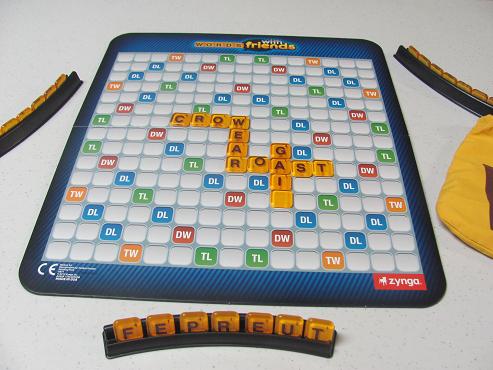Welcome to Purple Pawn, covering games played around the world by billions of people every day.
Second Look—Words With Friends
24 Dec
Posted by David Miller as Electronic Games, Modern Board Games
A little while ago, I wrote about Hungry Hungry Herd, one of the board games resulting from a joint venture of Hasbro and Zynga. Another Zynga property to get the board game treatment is, strangely enough, Words With Friends. I say “strangely” because Words With Friends is basically a variant of Scrabble, which in the United States is published by Hasbro. Anyway, if they’re okay with it, who am I to complain?
Now, if you’re reading a website about board game news, I highly doubt you’re not already familiar with at least one of them—Words With Friends or Scrabble—but just in case, let me briefly explain… Both are kind of inverse crossword games. That is, players are given a set of seven tiles with individual letters on them. Then each turn, a player’s goal is to use the letter tiles to form words on the game board. Each new word (after the first) must build off an existing word and read down or to the right. Players score points based on the letters played—each letter has a different point value—with bonuses (such as double-word or triple-letter) earned for words placed on particular spaces, and a big bonus for using all seven tiles in one play. After playing tiles (or discarding them if there are no words to be formed), the player draws new letters back up to seven. When all the letter tiles run out, the player with the most points is the winner.
For most of us, Scrabble and Words With Friends are decent, if sometimes frustrating, simple word games. Spelling correctly under pressure can be difficult. And it helps a lot to know a variety of two and three letter words, as well as words with the letters Q and Z. At higher levels of play—that is, when one has memorized a sufficient number of word spellings—the games are more about figuring probabilities, whether to play a letter now or hold on to it for a better play later. Between the two, Scrabble is bit more luck-dependent than Words With Friends.
Words With Friends is available in a travel-sized Words With Friends To Go version, which stores in a portable case, a Words With Friends Luxe version, which includes a rotating board and tile racks that can also hold a mobile phone (for the available Word Check and Score Pad app), and the middle-of-the-road, basic Words With Friends version, which was provided to me for review. With the $20 basic version, you get a die-cut cardboard game board (not a mounted board but sturdy enough); 104 orange, plastic letter tiles; four plastic tile racks; and a large cloth bag for storing and drawing tiles.
If you or someone you know is a fan of Words With Friends online, the board game version can make a nice gift. If somehow you don’t already have a crossword game at home, you really should remedy that, and Words With Friends is a fine choice. If you play Scrabble regularly and enjoy testing your vocabulary against other players, you might want to see what difference playing Words With Friends makes. Is one absolutely better than the other, though? I wouldn’t say so.
There is one problem I had with Words With Friends, however. Call it a minor beef, but still… You know how when a game is over, you’ll pick up the board and halfway fold it together in a V-shape, so you can just slide all the pieces in to the storage bag? Well, the Words With Friends board folds backwards! You’ll have to pick up the tiles one-by-one. A little thing, I know, but how’d that one get by the design team?
No Comments
Sorry, the comment form is closed at this time.
Trending
- Are Board Games Dangerous?
- Home
- Haunted Mansion Game of (After-)Life
- Leave Your Paper Terrain in Ruins
- Toy Fair 2016—Lego Ninjago Sky Pirates
- USPS Adds Board Game Flat Rate Box
- Pixar Collectible Dominoes
- The 20 Most Valuable Vintage Board Games
- Toy Fair 2017—WS Game Company
- Anti-Bullying Board and Card Games
Archives
Most Popular Articles
- The 20 Most Valuable Vintage Board Games
- Sequence Game, and Variants
- USPS Adds Board Game Flat Rate Box
- Baila, the Estonian Drinking Card Game
- The 13 Most Popular Dice Games
- The Truth About Dominoes On Sunday in Alabama
- Are Board Games Dangerous?
- Oh the Irony—Illuminati Card Game Continues to Inspire Conspiracy Theorists
- The Convoluted Story of Iron Wind Metals, Ral Partha, and Battletech Miniatures
- What Happened to the Jewel Royale Chess Set?
Recent Posts
- Toy Fair 2019—Breaking Games
- Talisman Kingdom Hearts Edition
- Toy Fair 2019—Winning Moves
- Toy Fair 2019—Games Workshop
- Toy Fair 2019—Star Wars Lightsaber Academy
- Toy Fair 2019—Stranger Things Games
- Toy Fair 2019—HABA
- Licensing Roundup
- Game Bandit
- 2018 A Difficult Year For Hasbro But Not For D&D Or MtG
Recent Comments
- on Toy Fair 2019—Winning Moves
- on Game Bandit
- on Second Look—Dungeons & Dragons Waterdeep Dragon Heist
- on Crowdfunding Highlights
- on Beyblade SlingShock
- on Game Bandit
- on Game Bandit
- on Watch This Game!, the Board Game Review Board Game
- on Second Look—Vampire: The Masquerade 5th Edition
- on Palladium Books Loses Robotech IP License, Cancels Five-Year-Overdue Robotech RPG Tactics Kickstarter





